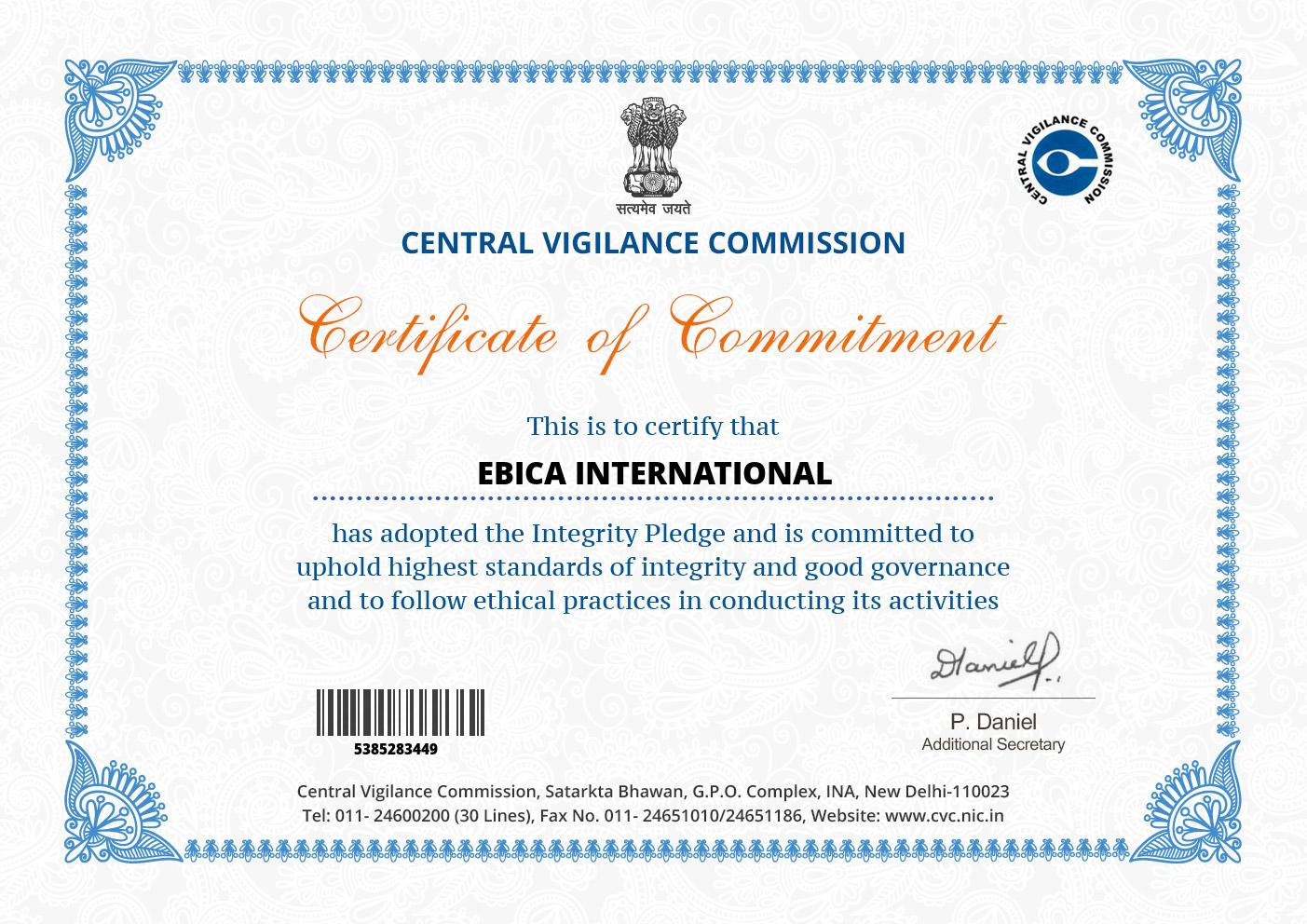Contents
EBICA Central Vigilance Certificate

What is CVC (Central Vigilance Commission)?
EBICA Central Vigilance Certificate
The Central Vigilance Commission (CVC) is a high government entity that was founded in 1964 with the aim of combating corruption within the government.
To improve the system, the Central Surveillance Commission (CVC) collaborates with government agencies.
How can I download the CVC certificate?
You can download the CVC Certificate from the official website https://pledge.cvc.nic.in/
For more information, you can visit the official website https://cvc.gov.in/
What are the Purpose and Functions of the Central Vigilance Commission (CVC)?
It is an autonomous organization in charge of supervising all surveillance actions carried out by the union government. Its main responsibility is to advise government agencies on how to “plan, execute, review and improve” their surveillance capacity. The Central Government of India established the CVC in 1964 as a crucial organization that could consider methods and initiatives to prevent all kinds of corruption including government corruption for better system and governance. CVC has been given various powers, including the ability to work independently as a major sovereign organization that is not subject to government authority. The CVC was established following the presentation of reports from the Committee for the Prevention of Corruption, whose chairman, Mr. K. Santhanam, had proposed the formation of this Commission. India’s first Chief Surveillance Commissioner, Mr. Nittoor Srinivasa Rau, was appointed. It should be noted that the Central Surveillance Commission is not a law enforcement agency. It works in conjunction with the Chief Departmental Surveillance Officers, or CBIs. The only investigation of the Central Surveillance Commission is on government civil works, which is carried out through the Technical Director. The government must approve the Central Surveillance Commission before it can begin investigating corruption allegations involving government personnel. In addition, the Central Surveillance Commission publishes a list of corrupt officials and advises that they be prosecuted.
Appointment
On the proposal of the Prime Minister, the Home Secretary and the Leader of the Opposition in the Lok Sabha, the President of India appoints the Central Surveillance Commissioner and Surveillance Commissioners. It is clear that CVC appointments are influenced by the government in some way.
Is CVC an organization without power?
CVC is sometimes seen as a powerless agency because it is only used as an advisory body, with no authority to bring criminal charges against government officials or order the CBI to launch investigations into any official beyond the rank of Joint Secretary.
Although the CVC is “somewhat independent” in its operations, it lacks the resources and capacity to act in corruption cases.
The Central Surveillance Commission has the following functions and powers in relation to the CBI:
Oversee the operation of the Delhi Special Police Establishment (DSPE) (ie CBI) in relation to investigations under the Prevention of Corruption Act 1988; or offenses provided for in the CrPC for certain categories of public servants, and issue instructions to the DSPE for the purpose of fulfilling this responsibility; to issue instructions and review the progress of investigations conducted by the DSPE into offenses allegedly committed under the Prevention of Corruption Act 1988.
As a result of the Vineet Narain case, the Supreme Court of India ruled that the Director of the CBI (and the Director of Enforcement) should be appointed based on the recommendations of a committee that includes the Central Surveillance Commissioner, the Home Minister and the Secretary of the Personnel Department. Before presenting its recommendations to the Cabinet Appointments Committee, the Committee should consult with the current Director of the IWC.
After consultation with the Director (CBI), the Committee in charge of the appointment of the Director of the CBI has the authority to recommend the appointment of officials at the level of SP and above in the DSPE.
The Chief Compliance Officer Appointment Committee has the authority to suggest, after consultation with the Chief Compliance Officer, the appointment of officers to positions in the Chief Compliance Officer at the Deputy Director level and above.
Regarding surveillance:
To make or cause to be made an inquiry or investigation into any transaction where a public official working in any organization under the executive supervision of the Government of India is suspected or believed to have acted improperly or corruptly;
Provide disciplinary and other authorities with objective and impartial guidance in disciplinary cases involving surveillance at various stages, such as investigation, inquiry, appeal, review, etc.
To exercise general control and supervision over the surveillance and anti-corruption work in the Ministries or Departments of the Government of India and other organizations to which the executive power of the Union extends; and Conduct or cause an investigation of reports received under the Public Interest Disclosure and Whistleblower Protection Act, and recommend appropriate action.
Respond to the Central Government’s request for mandatory consultation with the Commission prior to the adoption of any rule or regulation governing surveillance or disciplinary matters relating to persons appointed to public service and positions in connection with the affairs of the Union, or for members of All India Services.
The CVC is to be consulted when the Central Government drafts rules and regulations governing policing and disciplinary matters involving the staff of the Central Services and All India Services.
His key responsibilities include conducting a technical audit of government organization construction projects from a surveillance standpoint, investigating individual complaints about construction projects, and assisting the CBI with technical investigations.
Other functions of the Central Surveillance Commission
To exercise supervision over the operation of the Delhi Special Police Establishment (DSPE) with a view to investigation under the Prevention of Corruption Act, 1988; or crime provided for in the CRPC for certain classes of public servants and give instructions to the DSPE for the fulfillment of this responsibility.
Review the growth of the investigations carried out through the DSPE on the crimes allegedly committed under the protection of the CP Law.
To make an inquiry or cause to be made an inquiry or investigation into any transaction in which it is suspected or alleged that a public servant working in any organization, to which the governance of the Government of India extends, acted with a vicious purpose or in a corrupt manner.
Provide impartial and impartial advice to disciplinary and different authorities in disciplinary cases, involving the perspective of surveillance in extraordinary degrees, that is, investigation, inquiry, appeal, evaluation, etc.
Exercise daily control and supervision of surveillance and anti-corruption tasks in the Ministries or Government Departments. of India and other corporations to which the power of the Union government extends.
Preside over the Committee for the election of the Director (CBI), Director (Directorate of Execution) and officials at the SP level and above in the DSPE.
To conduct or make an investigation into complaints acquired under Public Interest Disclosure and Whistleblower Protection and advise grand action.
It can be stated that the Central Surveillance Commission is an apex Indian government body for tackling government corruption. It has the popularity of a self-sufficient body, free from the control of any executive authority, tasked with monitoring all surveillance activities below the Central Government of India.
The Central Surveillance Commission Act 2003 also empowers the Commission to exercise oversight over the operation of the Delhi Special Police Establishment (DSPE), now known as the Central Bureau of Investigation (CBI).
The Commission is also empowered to review the progress of investigations conducted with the assistance of the CBI and the growth of pending duties with the competent authorities for the provision of sanctions for prosecution for offenses alleged to have been committed under the Prevention of Corruption Act of 1988.
The Commission also exercises routine supervision over the surveillance administration of a large group below the Central Government.



